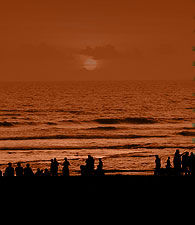Introduction:

Eid-ul-Fitr, popularly known as the "Festival
of the Breaking of the Fast". Fitr is derived from the word
‘fatar’ meaning breaking. Fitr has another meaning
derived from another word fitrah meaning ‘alms’. The
festival is intended to be a festive and joyous occasion. Special
foods and delicacies are prepared for the day and are distributed
among neighbours and friends.
To get to the significance of Eid, one must
first understand the meaning of Ramzan. ‘Ramz’ means
to burn, and fasting is considered to burn down ones sins. Fasting
or Roza starts at sunrise and lasts until sunset. During this
time no food or water is consumed. Pregnant women, the handicapped
and the ailing, people on a long journey, and ladies in confinement
are exempted from Roza, but they must resume fasting on recovery.
Eid Ul Fitr is a joyous occasion. It celebrates
discipline and kindness and strives to establish a semblance of
equality in our crazy chaotic cosmos.
Celebrated on:
It is celebrated after the fasting month of
Ramzan (the ninth month of the Muslim year), on the first day
of the Shavval month of the Hijri year (Muslim year).
Legends of the Festival:
According to the legend, one day Prophet Muhammad
had a vision in which the angel Jibril told him how Allah wanted
people to live. Then Allah's words were revealed to Muhammad through
the angel during the month of Ramzan, and the words were written
down to form the holy Qur'an. Prophet Muhammad declared the last
day of Ramzan to celebrate Id Ul Fitr and strengthening the feeling
of brotherhood.
Celebrations of the festival:
This festival celebrates the end of Ramzan,
the Muslim month of fasting It is an occasion of feasting and
rejoicing..On the festive day of Id Ul Fitr Muslims dress-up in
the new clothes, apply perfume and Muslim women decorate their
hands with beautiful textures using heena and wears shimmering
jewelry to celebrate the festive enthusiasm. The devotees gather
in the mosques to pray, friends and relatives meet and exchange
greetings and embrace each other. Prayers, family get-togethers
and feasts are the major highlights of the festival. Delicious
dishes like vermicelli and kheer are prepared and distributed
among friends and relatives in social get togethers.
Kashmiri Muslims do not prepare sivai for Eid.
Instead, they make several meat dishes, sweetmeats and kahva (Kashmiri
tea, made with dry fruits, spices and a special kind of Chinese
or Tibetan tea, strangely called ‘Bombay Tea’)
|







